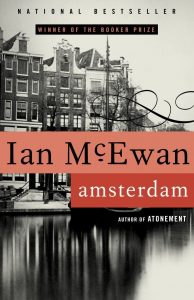To adhere to the adage: sometimes bad things happen to good people, and these tragedies we bemoan. But what of those calamities that also happen to fall on bad people, do we exchange our lament for applause?

They had it coming! So cry those who believe revenge is sweet, no matter at what temperature it is served.
I stumbled upon “Amsterdam” during a recent library visit. Its author and its svelte form called from the “recommended” rack. The book was a fortuitous find, a – per the New York Times – “morality fable, disguised as a psychological thriller,” one told with the descriptive, perceptive precision found in McEwan’s novels.
The story is that of two Londoners, a symphony composer, Clive, and a newspaper editor, Vernon, who find themselves outside of a crematorium on chilled winter’s day. Both are ambitious, both stand at the apex of their respective games (a location that hints of future diminishment), and both are former lovers of the deceased, one Molly Lane, a tempestuous woman of fierce carnal appetites whose other paramours included the current Foreign Secretary of Great Britain.
Molly took ill and died rapidly, and her abrupt descent from eros to ashes shakes Clive and Vernon. The composer feels the cold clamp of mortality on his hand as he struggles to complete his greatest symphonic achievement; the journalist feels invisible amid the chaos of daily publishing and the need to swap ethics for more readers. Neither wants to go out as Molly did, under the incarcerating care of another, so they make a euthanasia pact: When one approaches the brink of the abyss, the other will, painlessly, nudge him into it.
Little more can be said about the plot without revelation. But there is deviousness, cowardice, and avarice, and each exacts a price from Clive and Vernon. McEwan guides the story with expert assuredness, and it is a delight to follow him to a clever, satisfying ending that leaves just enough left unsaid to make you wish for a few more pages.
